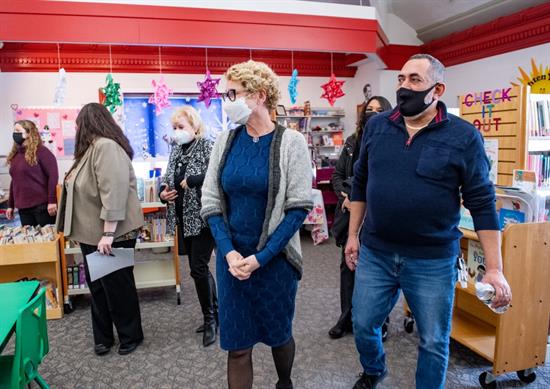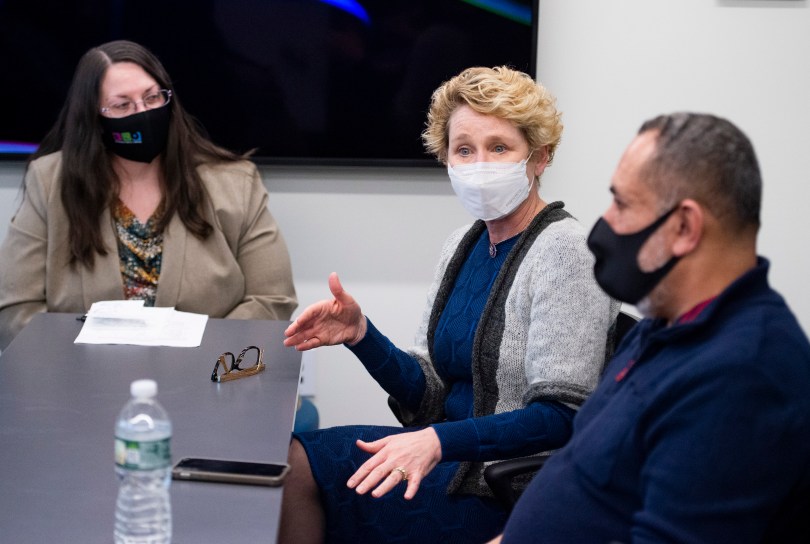Following trip to Ukraine, U.S. Rep. Chrissy Houlahan warns against Russian threat to democracyThe Chester County lawmaker was part of a bipartisan group that met last week with Ukrainian officials.
Washington,
January 31, 2022
Originally published in the Reading Eagle. Making a stop at the Reading Public Library Monday afternoon as part of a tour of city sites, U.S. Rep. Chrissy Houlahan took some time to discuss a trip she and 10 other House members took to the Eastern European nation last week. The bipartisan diplomatic visit came amid rising tensions in the region, with Russia massing hundreds of thousands of troops on the Ukrainian border and fears of an impending invasion on the rise. Officials in the United States have warned that an attack on Ukraine could happen at any time and have called on Russia to back down. Moscow officials, however, have denied any plan to attack. Houlahan, a member of the House Foreign Affairs and Armed Services committees, said the threat to Ukraine’s sovereignty is an immediate concern. She and other American officials fear for the people of Ukraine and are worried about the fate of the country’s democracy. But the threat doesn’t end there. The situation in Ukraine, she said, threatens democracy around the globe. “We, as Americans, should be concerned about the situation,” the Chester County Democrat said. “It’s very easy to be inward focused when things are hard here for so many. But it’s also important to be aware of what’s going an ocean away.” She said Ukraine is the “tip of the spear” when it comes to the struggle between democratic ideals and authoritarian regimes. “Ukraine is a young and vibrant democracy,” she said. “It’s being threatened by Russia with 130,000 troops stationed all around them trying to violate the sovereignty of its borders and trying to tell them what alliances they can participate in.” Houlahan warned that if democracy falls in Ukraine, there are concerns that it could fall in the Baltic states of Estonia, Latvia and Lithuania. And those three counties are members of the NATO alliance, which means the U.S. has an obligation to help defend them. “We have to have a unified response,” she said, noting that economic sanctions, humanitarian aid, military support and stationing U.S. troops somewhere in the region are all possibilities that should be considered.
Houlahan said her motivation for going on the trip was to try to learn what the rest of the world was thinking — including the Ukrainians — about how the U.S. and its allies can respond to this threat. Now that Houlahan is back, she said she hopes she can explain to the people in her community, her state and her nation why they need to care about Ukraine. “What we do here matters there and what they do there matters here,” she said. “All these events are interconnected.” A personal connectionThe sovereignty of Ukraine is also important to Houlahan on a personal level. She believes her father, Andrew Jampoler, was born there. Because he was born to a Jewish family in the midst of the Holocaust in 1942, she said a birth certificate that says he was born in Poland may not be accurate. She thinks he was actually born in a city that is now part of Ukraine. Houlahan said an authoritarian German regime invading the country during World War II has a frightening resemblance to the possible invasion by another authoritarian regime all these decades later. She said the current situation with Ukraine also has an eerie familiarity to previous conflicts with the then Soviet Union. Long before coming to Congress, Houlahan served as a project engineer in the Air Force focused on ballistic missile defense at the end of the Cold War. She said the vernacular of her time in service was filled with the buzzwords of that age: sphere of influence, intercontinental ballistic missiles and mutual assured destruction. “It was the language of my generation,” she said. But she said her travels last week to Ukraine made one thing clear: this generation might need to dust off that Cold War-era language in the face of Russian aggression and destabilization. Houlahan’s trip had two parts. Before heading to Kyiv, the delegation stopped in Brussels. They met with representatives from NATO and the European Union to discuss the security situation in Eastern Europe and the buildup of Russian troops along Ukraine’s border. “Our transatlantic partners are essential relationships and alliances that we must continue to strengthen as we coordinate and encourage unity on sanctions against Russia as well as other possible deterrent responses,” Houlahan said of her visit to Belgium. In Kyiv, the delegation met with Ukraine’s President Volodymyr Zelensky to discuss the security situation and reinforce support for the county’s sovereignty and territorial integrity. Houlahan said her main takeaway from that meeting is that the Ukrainian people are resilient, but Moscow’s dire threat to destabilize Europe through possible further invasion or other aggressive actions cannot be tolerated. “The bipartisan trip reaffirmed our broad commitment to Ukraine’s sovereignty,” she said. “While we hope Russia will pursue diplomacy and dialogue as a path to peace, we were there to reassure Ukraine that we will go to great lengths to diplomatically deter and punish the aggressive path Moscow is pursuing.” Houlahan said she will continue to push for stronger sanctions and additional security assistance. She also wants to reassure NATO allies that the U.S. remains committed to ensuring their security is ironclad. Visiting ReadingUkraine wasn’t the main reason that Houlahan visited Reading, which is part of the district she represents. She took part in a tour of local businesses, stopping by several Latino-owned establishments to hear about how the pandemic has impacted their operations and what she can do in Congress to help. She was guided on her outing by Democratic state Rep. Manny Guzman. Her final stop was at the Reading Public Library’s main branch on South Fifth Street. There library Executive Director Melissa Adams and Reading Mayor Eddie Moran highlighted some of the important things that have been going on at the library. Adams said the library will be using funds it received from the American Rescue Plan to start a senior telemedicine outreach program, digitize its extensive collection of Pennsylvania history, bolster its digital offerings, increase its Wi-Fi capacity so that people can use the connection outside the building and continue to provide virtual programming. It is also offering assistance to people looking to order the free COVID-19 test kits being offered by the federal government. “I’m so grateful to you guys for the work you do in our community,” Houlahan told Adams. Houlahan said the American Rescue Plan was designed to help fund the kind of programs and services that the library is working on, which will have an impact on the entire community. “I’m so grateful that you are taking advantage of the resources that we have been able to provide and also being innovative in the way that you are doing it,” she said. |
In the News




